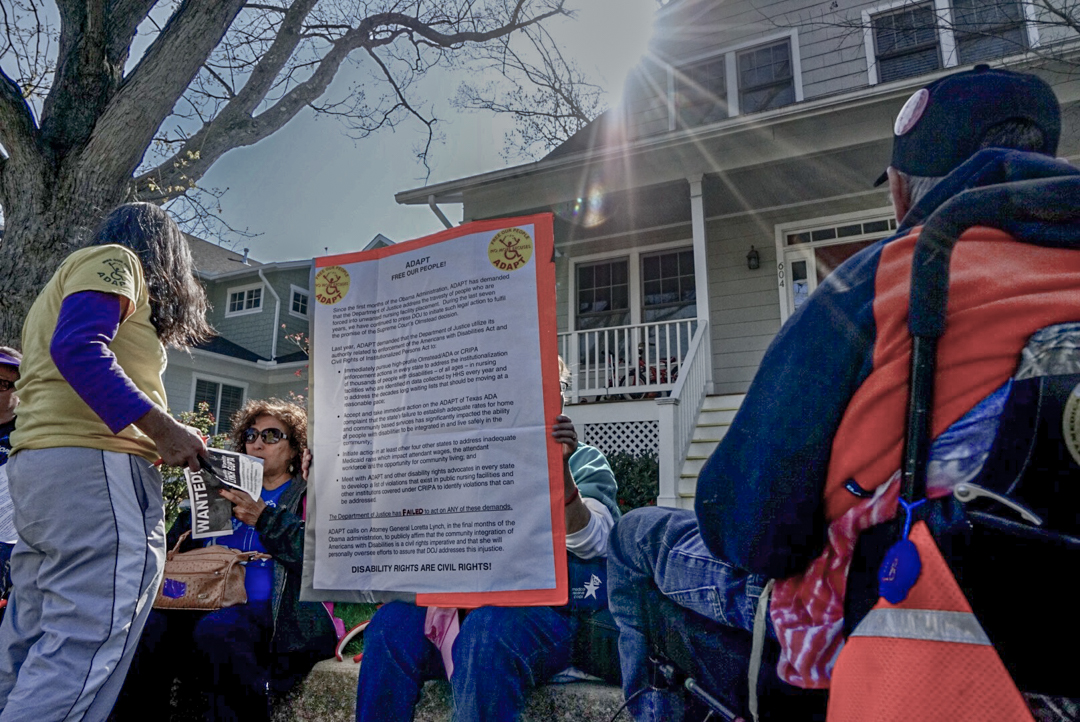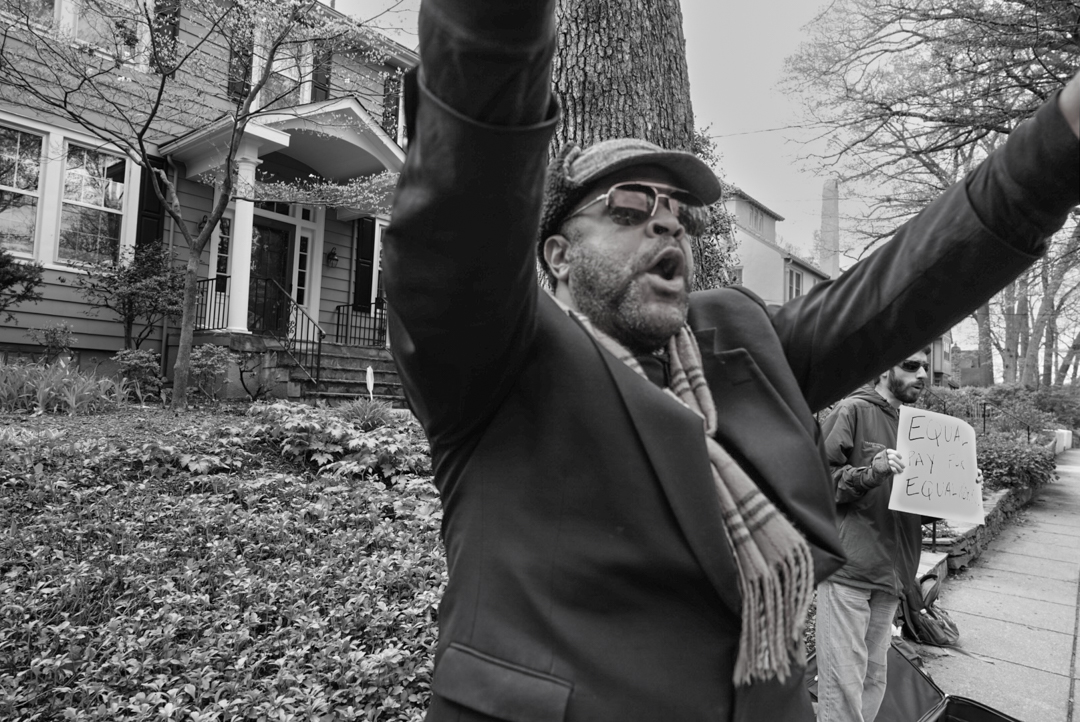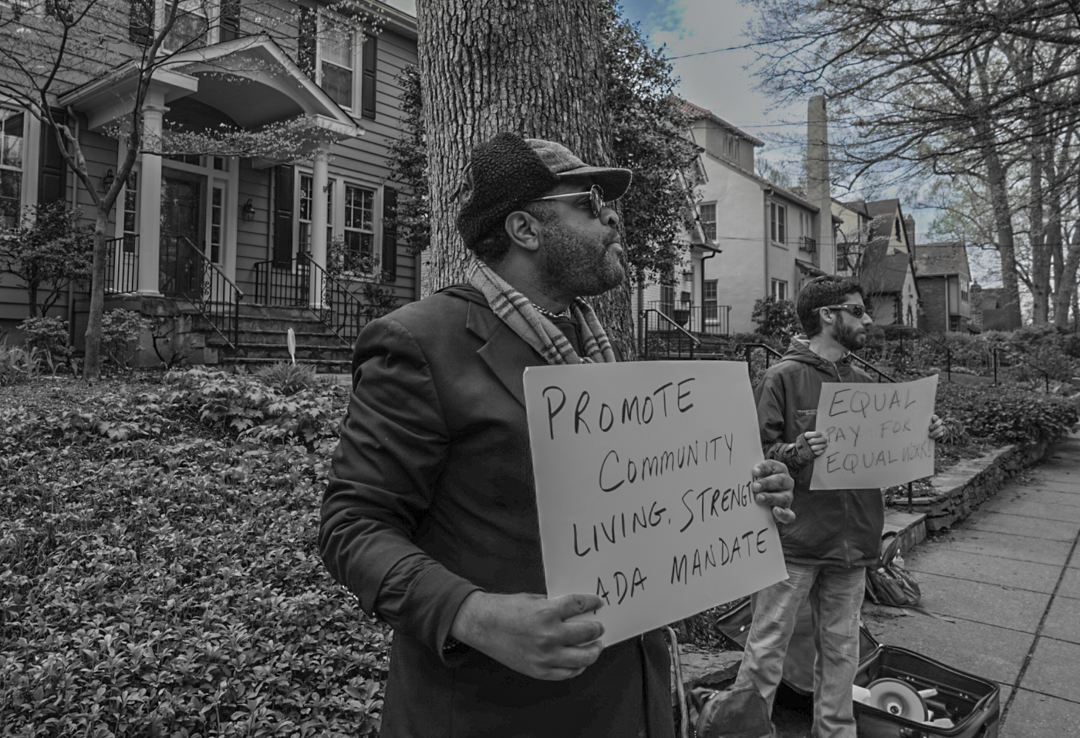
<< Previous Photo | Next Photo >>
Continue the LANDSCAPE Thread of Photos
Memphis Tennessee
Sometimes at work I get to take photos. Often the photos are work related and I don't try anything difficult. But this afternoon at a work event I had a chance to get away from everyone.
This photo is from the old Gaisman Community Center that is already torn down. The thing I saw at the time was the light and the trees. I also was testing the dynamic range of my camera. I thought it would be hard to capture detail in the shadows and I really thought that color would be the most difficult.
While I think a black and white photo can show the shadow and light in this photo, it also misses out on the subtle change of the leaves from green on the right to yellow on the left. The candy-stripe would lose some of its emphasis and you could not see the fine distinction between the clouds and the sky.
 When I judge shots at the Memphis Camera Club, I always put that additional analysis on a black and white photo. We are asked to judge the impact, and I know that the photos were taken with a color range. I theoretically ask the photographer first, if the black and white is intended to show more or if it is used to cover up.
When I judge shots at the Memphis Camera Club, I always put that additional analysis on a black and white photo. We are asked to judge the impact, and I know that the photos were taken with a color range. I theoretically ask the photographer first, if the black and white is intended to show more or if it is used to cover up.
I think recently of a photo of someone holding up a piece of cardboard with the word "Justice" written on it. I know that the reference was to Tyre Nicols murder here in Memphis, but the photo was in grayscale. There were no other hints or clues. If you don't know about the tragedy of Tyre Nicols and the social passion around his death, the photo would look like a piece of cardboard with the word "justice" on it.
As a judge, the photo is unremarkable. No foreground or background, no depth of field. Because it is black and white, there is little shadow or range in the grayscale. I did not give the photo a very good score.
As an activist, I realize that there is still much impact in the photo. I knew exactly what the reference was to and it did jolt my emotions. And as an activist and photographer, I thought of ways to make that a better photo. At the very top of the list is to include a person. If you could see the person and their expression matched the passion, that makes a good photo.
 Taking thousands of photos of activists, I often captured the signs, stickers, posters and t-shirts that activist's used to make their point. The real selling point of the sign however, is the expression of the individual.
Taking thousands of photos of activists, I often captured the signs, stickers, posters and t-shirts that activist's used to make their point. The real selling point of the sign however, is the expression of the individual.
For example, an ADAPT activist from Philly would relate nursing homes to the holocaust. She always went by "Spitfire," because of her assertive activism. She was active, loud and passionate about the demonstration; but the real significance is that she sold the connection. Spitfire called nursing homes "death camps'' and used Nazi terminology for forced incarceration in institutions. She felt it and expressed anger.
I mention Spitfire to make my point. I cannot say if everyone that views a photo of Spitfire at an action sees the same powerful expression that I do. But, I felt that photos of activists, especially their faces, can do the most to convey strong feelings.
Just to be clear, there was a person holding the cardboard that says "Justice," but only their hands make it in the frame. I feel that the person holding the sign, their expression is the real subject. My criticism is that they left the subject out of the shot.
Two more things. First, publications seem to like the signs because they are a shortcut to telling the story in a protest. The classic strike in Memphis where the Sanitation Department worker's carried signs that said "I AM A MAN," is a powerful use of the sign. It is a meaningful slogan and it conveys a strong message. It also helps that it is carried by a well-dressed person.
That is a great example of a sign, however, the worst example of a sign is the photo where you can't read the whole thing. I have taken photos of people engaged in a demonstration with clear agony on their face, but holding a sign that you can't see the whole text. The image can be received as not getting the message across. That if the viewer could see the sign then it would be clear what they are angry about.
The last thing is a cheesy shot. Someone poses and smiles holding the sign so you can read it. They make exaggerated hand gestures or shrug their shoulders. Whatever it is, it is some body language that does not match the demonstration. This strikes me as insincere. I would often tell people who posed for me at a protest to "look like a disability rights activist."
This is some of my best advocacy, but it is more complex than most people have time to care about. I try to make it as straight forward as possible. Ultimately, it is not pure success, but I was successful statewide.
Thursday, May 4, 2017
By Tim Wheat
The state of Tennessee developed a unique service with the new Employment and Community First initiative. Tennessee Amendment 27 was the first attempt in the U.S. to bring integration and independence to Americans that were often trapped on waiting lists for programs. All of the state’s six IL Centers were asked to be a part of providing the tools to help people with disabilities all over the state to live independently and to work for employment and self-sufficiency.
 July 1, 2016 the program went live and MCIL had done the work to build our program and services from scratch. In the ECF program we offer: Peer-to-peer Self-Direction; Community support, development, organization and navigation; Health Insurance Counseling (Forms Assistance) and Independent Living Skills Training. At the time we were also offering Personal Attendant Services and Supportive Home Care through our existing PAS Services department.
July 1, 2016 the program went live and MCIL had done the work to build our program and services from scratch. In the ECF program we offer: Peer-to-peer Self-Direction; Community support, development, organization and navigation; Health Insurance Counseling (Forms Assistance) and Independent Living Skills Training. At the time we were also offering Personal Attendant Services and Supportive Home Care through our existing PAS Services department.
MCIL desperately needed more service hours for our PAS program and those two ECF services seemed to be in demand. Increasing our capacity with ECF Personal Attendant Services and Supportive Home Care seemed just what the Center needed to continue consumer oriented home and community services. MCIL did not get any of the first ECF referrals and by October we had paid for all necessary training and background checks for our staff and we had been certified by both Managed Care Organizations.
To date, MCIL has not received a single appropriate referral. We have heard from five people and some “Support Coordinators” from the MCO’s, but none were looking for services that MCIL had agreed to provide. One referral may have included services we offer, but it was from a county outside our area.
Since the beginning of 2017, it has been very hard here at MCIL because our PAS program dipped below the hours needed to keep it sustainable and keep the dozens of Direct Support Professionals employed. In March MCIL had to end the program and two additional professionals who administered the program lost their jobs. The state’s ECF program said they had 1,700 slots in the first year but not one appropriate referral came to MCIL.
 MCIL did not end its ECF program however, although clearly we could not offer Supportive Home Care and Personal Assistance services because we no longer had a PAS program. The MCOs did not call for any of the other services that MCIL had to offer.
MCIL did not end its ECF program however, although clearly we could not offer Supportive Home Care and Personal Assistance services because we no longer had a PAS program. The MCOs did not call for any of the other services that MCIL had to offer.
From the beginning, we had assumed the IL Skills would be our bread-and-butter. MCIL has more than 32 years of IL experience in the community and it is our calling-card, it is in our name.
The Memphis Center for Independent Living never removed the service “IL Skills Training” from our Policy and Procedure Manual but the Managed Care Organizations apparently could not approve us to provide IL Skills because, they claimed, an IL Skills provider must have be a “Licensed Day Habilitation Provider” in order to be credentialed by the Managed Care Organizations.
The MCO’s did not have any problem with us continuing to list IL Skills as a service we provide, because they could not coherently explain why we would need a Day Services license. It did not make any sense. The IL Skills according to the state regulations could not be provided in a facility and had to be one-on-one services offered in the least restrictive setting.
From early on in this process, the Statewide Independent Living Council and other CILs in the state were advocating to get rid of the Day Services license. The other Tennessee CILs were working on developing ECF programs of their own and saw the license as a barrier. One-by-one the CILs dropped out of the ECF program for a variety of reasons, including the burden of the unnecessary license.
The Tennessee Employment and Community First Program had a requirement that providers of Independent Living Skills Training must also be a “Licensed Day Habilitation Provider” in order to be credentialed. The burden of this license is one of the reasons that Tennessee CILs dropped the ECF services.
MCIL was approved by the two Managed Care Organizations to provide some ECF services, but the Center was informed that the Day Services License was essential to provide IL Skills Training. Since the ECF program began in July of 2016, no one was really clear on why the requirement existed. The MCO representatives agreed that IL Skills by regulation could not be provided in a facility.
The Day Habilitation license also has requirements on the staff who provide the services; however, the ECF requirements are more stringent. The Day Services requirement mandates at least one staff member is available for every six clients, while ECF is essentially a one-on-one skills training. Background and registry checks are also required by ECF so there is no material part of the Day Habilitation license that would be relevant.

Of course the purpose of the Day Services license is to approve the physical environment where services are provided. There is absolutely no need for the license where training is to be in the individual's home and community. It is an absurd requirement.
“The odd requirement to be a ‘Licensed Day Habilitation Provider’ seems in contrast to the stated goals of the ECF CHOICES program and has no benefit for the state or individuals that may use the program,” MCIL said in a February letter to Dr. Wendy Long, the Director of TennCare. “Most importantly, please note that providing Independent Living Skills training according to the ECF CHOICES Guidelines would prohibit any provider from using a facility or adult day care center because the services are to be delivered in the community, in the least restrictive setting and in the individual’s home and community.”
On April 21, 2017 the state essentially changed the requirement. In a letter to the Program Director of MCIL, Patti Killingsworth, the Assistant Commissioner and Chief of Long Term Services and Supports wrote that the provider qualifications would be adjusted.
“A Center for Independent Living,” said Ms. Killingsworth in the April 21st letter, “as defined in federal law, that is receiving federal funding from [the] federal Department of HHS to operate as a Center for Independent Living is qualified to provide services in the Employment and Community First CHOICES program that would otherwise require an Adult Habilitation Day Facilities license.”
The state carved out an exemption for CILs, they did not get rid of the unnecessary requirement. The ECF services are to focus on individual integration and independence, the adult day services concentrate on safety. This is the contrast that MCIL noted in the letter to TennCare Director Wendy Long, the state grants approval for a program that has a license, even though the license has nothing to do with the services offered.
Nearly a year after the program rolls out, MCIL may offer Independent Living Skills training. However, the Center and other CILs in Tennessee cannot have a good feeling about the long-term viability of the program. Most importantly is how long it took to have the state recognize the problem with the day services license. For a year MCO’s and TennCare recognized the problem; facility license for non-facility services, and failed to act.
In my dealing with MCOs, they listened politely to our case, but simply agreed that the requirement did not make sense. Reason did not climb the ladder to action. For most CILs and small providers in the state, the unreasonable requirement to have a Day Habilitation license seems to be just another bureaucratic hurtle that made the overall program not worthwhile.
MCIL may provide IL Skills Training now because of the finding of the state, but the struggle of all the CILs, the SILC and small providers may say more about the future of the Employment and Community First Program.
Photo by Tim Wheat.